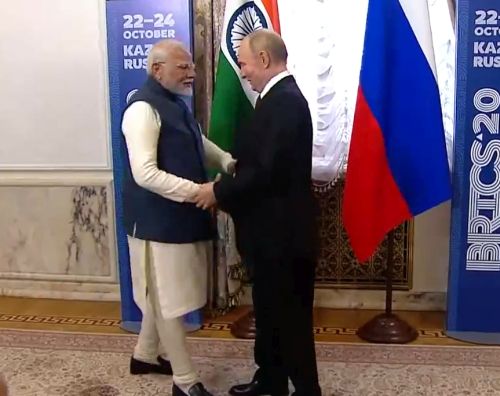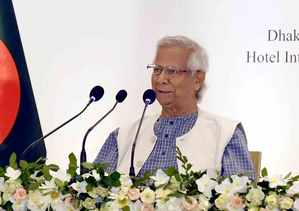International
August 11: Commemorating Balochistan's struggle for sovereignty (IANS Analysis)
New Delhi: August holds substantial historical significance for South Asia. While the Independence days of India and Pakistan on August 15 and August 14, respectively, are well known, the importance of August 11 for the Baloch people and Balochistan is less recognised.
On this date in 1947, the departing British colonial administration announced that leaders of the Pakistani Movement had signed a Standstill Agreement with the rulers of the Kalat Khanate, the precursor to modern-day Balochistan, effectively acknowledging its sovereignty just four days before Pakistan’s creation through the partition of India.
This date is significant as it marks the Baloch reclaiming their homeland after a century of British colonial rule.
However, this Independence was short-lived as Pakistan’s founder, Mohammad Ali Jinnah, orchestrated a takeover of Balochistan by the Pakistan Army through force in March 1948. Since then, Balochistan has been ruled under a stringent, imperialistic agenda.
For the Baloch nation, August represents Jinnah’s betrayal, Pakistan’s ongoing oppression, and yet a glimmer of hope for freedom, evidenced by the robust resistance led by Baloch women.
As Baloch nationalist groups such as the Baloch National Movement (BNM) and the Baloch Students Organization (BSO) prepare to commemorate Independence Day, they are organising global events like seminars, sit-ins, and protests to remind the international community of the ongoing repression of the Baloch people under Pakistan’s imperial military rule.
It is crucial to revisit, highlight, and debunk the disinformation propagated by Pakistan regarding key historical events.
The Pakistani government’s narrative, which emphasises the so-called accession of Kalat to Pakistan, often serves to obscure the treachery of its founding leaders, like Jinnah, towards the Baloch nation and the military force used to coerce Baloch leaders into signing the accord.
Pakistani rulers have excelled in crafting disinformation narratives to obscure Jinnah’s promise to respect the region’s sovereignty, its subsequent forceful annexation, and the ongoing cycle of repression in Balochistan.
This context is essential for understanding the current state of the Baloch resistance movement and Pakistan’s colonial treatment of Balochistan.
Balochistan’s current plight is as much a result of Pakistani state treachery as it is of the British colonial government’s actions.
As the British colonial empire withdrew from the subcontinent and the partition of India became inevitable, the future of the princely states emerged as a critical issue.
Unlike the approximately 560 princely states considered internal matters of the British Indian government, which were permitted to join either India or Pakistan, the Kalat Khanate, under the leadership of Mir Ahmad Yar Khan, posed a distinct case.
It was classified with Nepal, Sikkim, and Bhutan, considered external affairs of the colonial administration and thus recognised as sovereign entities.
Interestingly, Mohammad Ali Jinnah, serving as the legal advisor to Ahmad Yar Khan since 1946, championed the Kalat Khanate’s sovereign status with the British, aiding in its recognition. Kalat’s position was strengthened by Mehrab Khan’s 1838 agreement with the British, which acknowledged its independence.
Additionally, a treaty in 1878 granted Kalat internal autonomy, unlike other Indian princely states.
Consequently, a trilateral Standstill Agreement was signed by Mir Ahmad Yar Khan, Jinnah, and Liaquat Ali Khan, alongside British representatives, at a roundtable attended by Lord Mountbatten on 4 August 1947.
This agreement, formally announced on 11 August 1947, recognised Kalat’s political autonomy and stated: “Pakistan recognises Kalat as an independent sovereign state in treaty relations with the British Government, with a status different from that of Indian princely states.”
While India and Pakistan emerged as separate states at midnight on 14-15 August 1947, Kalat had already declared its independence on 12 August.
However, this autonomy was short-lived as the Jinnah-led Pakistani leadership soon betrayed the Baloch nation by coercing Mir Ahmad Yar Khan into acceding to their newly formed state.
Pakistan’s behaviour was consistent with the expansionist tendencies of its leadership, evidenced by their violation of the Standstill Agreement with the Maharaja of Jammu and Kashmir in October 1947, when they invaded the princely state and have occupied part of it ever since.
Similarly, following the invasion of Kashmir, the Pakistani government threatened to invade the Kalat Khanate if its rulers resisted these expansionist demands. One can only imagine the sense of monumental betrayal Ahmad Yar Khan must have felt, given that the very person who had advocated for Kalat’s independence with the British was now seeking to annex Balochistan at gunpoint.
It is important to note that Pakistani narratives often emphasise the so-called Shahi Jirga of 29 June 1947, where representatives from Kharan, Las Bela, and Makran—areas under British control in Balochistan—are claimed to have voted in favour of joining Pakistan.
However, this narrative is misleading. The jirga lacked proper mandate, as representatives of the Kalat Khanate, which comprised the major geographical expanse of historic Balochistan, were excluded from voting. Moreover, a week before this vote, on 22 June 1947, the same jirga members, along with Baloch sardars, acknowledged Kalat’s suzerainty through a letter to Ahmad Yar Khan, granting him the authority to determine Balochistan’s fate with the British, Indian, and Pakistani leadership. Even the then-president of the Balochistan Muslim League, Qazi Muhammad Isa, stated that this jirga “in no way represents the popular wishes of the masses.”
As Jinnah and the Pakistani leadership intensified their pressure, Ahmad Yar Khan ensured a democratic resolution by convening a special session of the Dar-ul-Umara (House of Lords) and Dar-ul-Awam (House of Commons).
These democratic bodies, established after the end of British paramountcy on 15 August, unequivocally voted in favour of Kalat’s independence multiple times between 14 December 1947 and 25 February 1948. Offended by the Baloch people’s referendum and insistence on an independent sovereign path, the Pakistani leadership dispatched its army to Balochistan.
This military intervention aimed to coerce the Kalat Khan into surrendering, which was eventually achieved on 27 March 1948, thereby ending Balochistan’s short-lived independence of 227 days. However, this widely opposed annexation sparked the first Baloch revolt against the state of Pakistan, led by Mir Naroze Khan, Ahmad Yar Khan’s brother, which was violently suppressed by the Pakistan Army.
Since then, Balochistan has remained under the oppressive control of Pakistan, which consistently uses violence to silence the Baloch people, even suppressing calls for basic rights and resources.
The region has become akin to a colonial administration, focused solely on exploiting its natural resources at any cost. Pakistan has even invited China, its so-called iron brother, to exploit the region’s valuable mineral resources.
It appears that Pakistani rulers have devised a two-pronged strategy. On one hand, Chinese companies have been delegated to loot and plunder Balochistan’s resources, while on the other, the Pakistan Army is tasked with suppressing any form of Baloch resistance to this imperial plunder.
Consequently, Pakistan’s military has employed every oppressive tactic imaginable and engaged in widespread human rights abuses, including enforced disappearances, extrajudicial killings, sexual violence, and organ harvesting, among other atrocities, on an industrial scale.
Despite this, the Baloch people have persistently resisted the occupation both politically and through an armed insurgency necessitated by the oppressive tactics of the Pakistan Army. The fifth and by far the largest phase of armed resistance, initiated in 2005 following the killing of Nawab Akbar Bugti, is currently ongoing.
However, the resistance landscape in Balochistan is undergoing a fundamental and revolutionary shift, with the mantle now being taken up by young Baloch individuals, particularly women.
This shift is exemplified by the ongoing mass protest movement led by the Baloch Yekjehti Committee (BYC), featuring prominent figures such as Dr. Mahrang Baloch and Sammi Deen Baloch—both victims of Pakistan Army violence. This movement seeks to end the genocidal tactics of the Pakistan Army and achieve political rights.
Nevertheless, as the resistance movement endures, for the Baloch people, August 11 remains deeply ingrained in their collective memory as a day symbolising the broken commitment and unfulfilled promise of independence from Pakistan.
As the Baloch observe this day and reaffirm their determination to continue their path of resistance, it calls for self-reflection. They must recognise that the battle for their right to self-determination and a free homeland is theirs alone to fight.
Simultaneously, the international community cannot and should not ignore the crimes of the Pakistan Army in Balochistan.
Instead, the current need is to support the Baloch people as they struggle for their right to live a free and dignified life. This is the least the global community can do.
–IANS
scor/
International
Lee Hsien Yang seeks refuge in United Kingdom

Lee Hsien Yang, the youngest son of Singapore’s founding father, the late Lee Kuan Yew, announced on Tuesday that he is now a political refugee in the United Kingdom after seeking asylum from the British government “as a last resort.”
“I remain a Singapore citizen and hope that someday it will be safe to return home,” Lee stated in a Facebook post, as reported by Channel News Asia (CNA).
Citing what he described as the Singapore government’s “attacks” against him, Lee, who is the younger brother of former Prime Minister Lee Hsien Loong, revealed that he sought asylum protection in 2022.
Lee Hsien Yang and his late sister, Lee Wei Ling, who passed away earlier this month, have been in conflict with their brother Lee Hsien Loong over the fate of their father’s home following his death in 2015, resulting in a public dispute that has estranged the siblings.
In an interview with the UK-based newspaper The Guardian, Lee alleged that a “campaign of persecution” compelled him to seek asylum in Britain.
In response to his claims, the Singapore government stated that there is “no basis” for his allegations of “a campaign of persecution” or other assertions regarding political repression in the country.
“Singapore’s judiciary is impartial and makes decisions independently. This is why Singaporeans have a high level of trust in the judiciary,” a government spokesperson remarked.
The spokesperson added that there are no legal restrictions preventing Lee and his wife, lawyer Lee Suet Fern, from returning to Singapore. “They are and have always been free to return to Singapore,” the spokesperson said.
Lee and his wife have been outside of Singapore since 2022, having opted not to attend a scheduled police interview regarding potential offenses related to providing false evidence in judicial proceedings concerning their father’s will and the family home.
Lee and his late sister, who had been living at the property, alleged they felt threatened while trying to fulfill their father’s wish to demolish the house. They also accused their elder brother, former Prime Minister Lee Hsien Loong, of abusing his governmental influence to advance his personal agenda.
International
Indo-Russian ties are stronger than ever before at BRICS

Kazan, Russia: Prime Minister Narendra Modi held a bilateral meeting with Russian President Vladimir Putin on the sidelines of the 16th BRICS Summit.
During the meeting, President Putin remarked, “I recall our meeting in July, where we had productive discussions on various issues. We’ve also spoken over the phone several times. I am very grateful you accepted the invitation to come to Kazan. Today, we will attend the BRICS Summit’s opening ceremony, followed by dinner.”
PM Modi responded by expressing his appreciation, saying, “I sincerely thank you for your friendship, warm welcome, and hospitality. It’s a great pleasure to visit such a beautiful city as Kazan for the BRICS Summit. India shares deep historical ties with this city, and the opening of our new embassy here will further strengthen these connections.”
International
Laos seeks to enhance nutrition amid climate change concerns

Vientiane (Laos), Aug 22 (IANS) Representatives from the Lao government and development partners have attended a conference here titled “Climate Change and Nutrition in Laos: Intersections and Interventions” to discuss the impact of climate change on nutrition in the Southeast Asia country and potential solutions.
Speaking at the conference, deputy director general of the Department of Hygiene and Health Promotion under the Lao Ministry of Health Viengkhan Phixay, said, “We gather to address a critical and interwoven issue: the impact of climate change on nutrition and how we can work together to tackle these challenges,” Xinhua news agency reported.
The Lao government is actively engaged in this endeavor, with numerous policies and initiatives aimed at addressing both climate change and nutrition, Lao National Television reported on Thursday.
“By leveraging the Scaling Up Nutrition network in Laos, which is led by the government, and supported by civil society, donors, and the United Nations, we have a robust platform to tackle the negative impacts of climate change while improving nutrition and overall health for everyone in Laos,” Viengkham said at the conference held on Monday.
The conference featured a series of presentations that not only detailed evidence-based research but also introduced innovative tools for measuring and enhancing nutrition under the impact of climate change.
The conference stressed the critical need for integrated approaches to tackle the intertwined challenges of climate change and nutrition, and setting the stage for impactful future collaborations.
–IANS
int/psd
International
One killed, seven injured in shootout in Iraq

Baghdad, Aug 22 (IANS) A civilian was killed while seven others were injured on Thursday in a tribal shootout in Iraq’s holy Shiite province of Najaf, according to a local security source.
The shootout erupted in the early hours between armed men from the local tribe in the al-Zarga area in northern Najaf, some 160 km south of Baghdad, a local police officer told Xinhua on condition of anonymity.
The clash resulted in the killing of an Iraqi civilian and the injury of seven others, including three Iranian Shiite pilgrims, the source added.
A joint force from the Interior Ministry’s emergency response division and Najaf provincial police arrested 53 gunmen from both sides of the shootout and seized weapons and ammunition, the Interior Ministry said in a statement.
It added that search operations are ongoing to locate additional gunmen and weapons, with more details to be released later.
The incident took place as numerous pilgrims traveled to the city of Karbala to observe Arbaeen, which marks the end of a 40-day mourning period for the killing of Imam Hussein, the grandson of Prophet Muhammad, in the Battle of Karbala in 680 A.D.
Typically, these pilgrims also visit Najaf as part of their journey to Karbala.
–IANS
int/jk/arm
International
Bangladesh seeks $1 billion budget support from World Bank

Dhaka, Aug 22 (IANS) Bangladesh’s interim government has sought $1 billion from the World Bank as budgetary support.
The call came from the country’s Power, Energy and Mineral Resources Adviser Muhammad Fouzul Kabir Khan’s meeting with Abdoulaye Seck, the World Bank’s Country Director for Bangladesh and Bhutan, in Dhaka on Wednesday.
He made the plea as the ministry owes more than 2 billion dollars to suppliers in import costs of power and energy, Xinhua news agency reported.
Khan mentioned that the interim government, which was formed with many pressing mandates, is due to settle a $2 billion debt left by the previous government in the power sector.
He said they have already suspended activities under the much-criticized Quick Enhancement of Electricity and Energy Supply Act 2010 and abolished the government’s power to set energy prices without any public hearing.
On August 5, the former Prime Minister of Bangladesh, Sheikh Hasina, was ousted from her country and power, ending her rule since January 2009.
This event was seen as a massive escalation, with what initially started as student’s protests and resulted in a major crisis in Bangladesh.
Earlier on August 8, Nobel laureate Muhammad Yunus took oath as the head of Bangladesh’s interim government.
–IANS
int/jk/as
-
Video2 years ago
PM Modi Attacks Congress in Karnataka with “Kerala Story”
-
Politics2 years ago
Siddaramaiah & DK Shivakumar sworn in as Chief Minister & Deputy CM respectively
-
Cricket2 years ago
CSK players rejoice 5th IPL title with their families (Pics)
-
Entertainment2 years ago
Karan Deol weds his longtime Girlfriend Drisha Acharya (Pics)
-
Sports7 years ago
History Of Official FIFA WORLD CUP Match balls
-
India2 years ago
Ashwini Vaishnaw: Railway Board recommends CBI probe in the Odisha railway disaster
-
Entertainment2 years ago
Urvashi Rautela dazzles on Cannes 2023 red carpet (Pics)
-
Entertainment2 years ago
Sunny Leone gets ready for Kennedy premiere in Cannes (Pics)






























